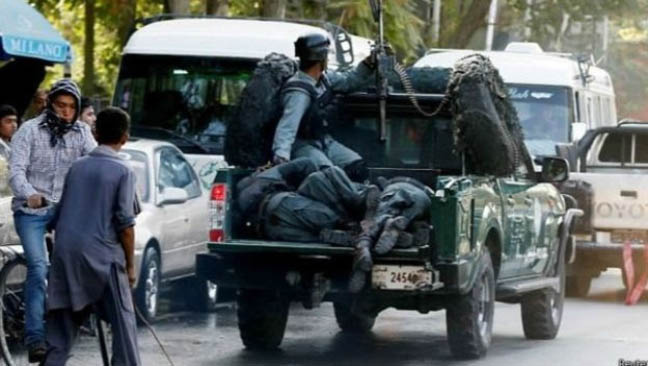Terrorism, which hampered democracy in Afghanistan, has been a controversial issue and the peace negotiation came to stalemate after years of fluctuation. Afghanistan’s neighboring countries and international allies promised to broker the talks and bring the Taliban elements to the peace table, but the attempts were proved abortive and militancy continued unabated up to now. The Taliban insurgents intensified their attacks with the establishment of the National Unity Government (NUG) and inflicted heavy casualties upon Afghan soldiers and civilians within the past two years.
The NUG is beset with insurgency and Omar’s second successor Mullah Haibatullah – who is also changed into a reclusive leader – orchestrates attacks against Afghan government. To show a backlash against the Taliban’s heavy offensives, the NUG, unlike former administration, adopted hard policy towards warring parties and carried out deadly attacks. The interminable conflict between the government and militant fighters continue without a positive result. Worst of all, the NATO combat mission ended without the fruition of “war on terror”.
Threatening regional peace and stability, the issue of terrorism involved many countries. Now the public believe that war will lead only to casualties and instability and its cycle will never stop. Therefore, Russia is set to host an international conference on Afghanistan on April 14, 2017 bringing representatives from China, Pakistan, Iran, India and five central Asian countries where they would hold discussions on how to strengthen the peace process in Afghanistan by dragging the defiant Taliban to the negotiations table. This comes as bilateral relations between Afghanistan and the Russian Federation recently soured following the confirmation by Russian officials that Moscow had been in talks with the Afghan Taliban.
The stability of Afghanistan is menaced not only by the Taliban fighters but also by the self-proclaimed Islamic State of Iraq and the Levant (ISIL) group. Little wonder, after gaining firm foothold in Afghanistan, the ISIL group stoked sectarian violence and killed people, including women and children, on the grounds of their race, color and creed and filled the air with a sense of strong fear and disappointment. Hence, the ISIL group intended to destabilize the country and pressurize the government through murdering non-combatants. They also sought to recruit soldiers via poisoning the minds of teenagers, temptation or threat. It is really surprising to see the rapid growth of the ISIL group. The caliphate was announced on June 2014, but some 90 terrorist attacks were either carried out or inspired by ISIL in 21 countries around the globe until early 2016. This reflect the fact that the group is supported by a strong mysterious hand. In Afghanistan, ISIL continues a guerilla-style fighting but if this trend goes on, it will widen the realm of its influence.
Both the issue of the Taliban and ISIL groups will be discussed in the upcoming conference. But the question is that will this conference bear the desired fruit?
It is the third conference being hosted by Moscow but the issue of terrorism remains as serious as ever before. No wonder, if the Taliban do not show the green light, such conferences will be void of a tangible result. Secondly, the trust between the Taliban and Afghan government has been eroded since the militants played foul game within more than a decade and even killed the head of Afghan High Peace Council (HPC) Professor Burhanuddin Rabbani on September 20, 2011. They did not cease violence and bloodshed, either. It is believed that pushing the Taliban to hold a genuine peace talk with Afghan government will be far significant.
In fact, the armed opposition groups, which violate the rights of people and destroy buildings, are not called political parties and will hardly make a peace agreement with government. In other words, the insurgents do not favor diplomacy over militancy and try to impose their words by the barrel of gun. Furthermore, their aggressive ideology pigeonholes both the nation and state to justify their acts of violence. In short, they are ideologue and/or militant outfit rather than political one. Just think of the ISIL group, will it hold negotiation with countries? The answer is negative for its highly fundamental ideology.
Considering these issues, Afghan nation nurtures no gleam of hope for such conferences for repeated failures. Their rights and freedoms were trampled upon despite the establishment of democratic administration. They flocked to ballot boxes within three rounds of presidential elections dreaming for a society void of violence and bloodshed. On the other hand, the government vowed to “establish an order based on the peoples’ will and democracy; form a civil society void of oppression, atrocity, discrimination as well as violence, based on rule of law, social justice, protecting integrity and human rights, and attaining peoples’ freedoms and fundamental rights”. These commitments are yet to be fulfilled.
It is likely that terrorist groups are the greatest obstacle before democracy and show no willing to peace talks. Furthermore, they do not observe the rule of war and violate human rights and humanitarian law flagrantly. In such a case, there seems no way left for Afghan government other than practicing upon the well-known maxim “if you want peace, prepare for war”. So, the regional and international countries had better strengthen Afghanistan militarily for the elimination of terrorism.

